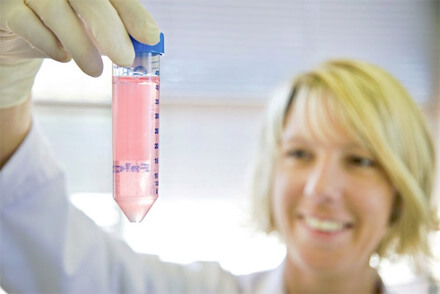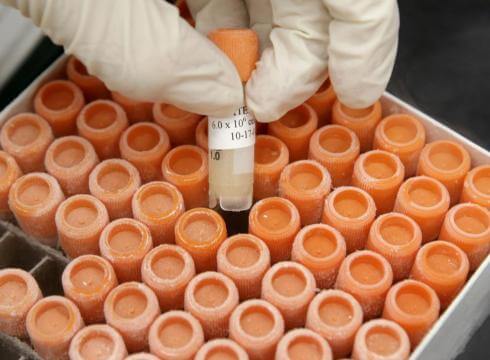Diabetes treatment with help of regenerative medicine in UCTC
Specialists of the Unique Cell Treatment Clinic have achieved outstanding results treating the diabetes types I and II with fetal stem cells and we had this method approved by the Ministry of Healthcare of Ukraine recommendations in 2000. Since 1993 this diabetes treatment method developed by Professor Smikodub has been protected by numerous patents of Ukraine and many other countries. Administration of fetal stem cells results in well-marked hypoglycemic effect (decrease of level of the blood sugar), it allows reduce the exogenous insulin dose by 60–70% and helps to achieve stable and long-term remission in most cases.
Diabetes treatment with suspensions containing fetal stem cells is highly effective at different stages of this disease with any complications:
-
Newly diagnosed IDDM (Insulin Dependent Diabetes Mellitus);
-
Diabetes mellitus that is complicated by chronic renal insufficiency (grades I-III), anemic syndrome and diabetic nephrosclerosis;
-
Unstable course of diabetes mellitus, when it is impossible to find the adequate dose of insulin administered;
-
Diabetes associated with immune defiсiency and infection complications;
-
Diabetes mellitus complicated by blood vessels diseases of lower extremities, diabetic foot;
-
Sugar-lowering drugs resistance of diabetes type 2 and the need to transfer the patient to insulin intake course.
Effects of diabetes treatment with suspensions containing fetal stem cells
Cell therapy in cases of Mellitus diabetes treatment allows improving the patient’s condition significantly, as well as the entire clinical picture of the disease course. The clinic has a positive experience of fetal stem cell administration at any stages of diabetes, including early ones. After our cell therapy, insulin treatment is not required for a quite long time. After fetal stem cells application, patients notice the normalization of immunological and hematological indices, the reduction of manifestation of micro- and macroangiopathy, working capacity restoration and life quality improvement. The treatment course slows down the progression of the disease and remission periods become 2-3 times longer. This is why stem cell therapy is an excellent prevention of possible diabetes mellitus complications.
The syndrome of early posttransplantation improvements
The syndrome of early posttransplantation improvements described by Professor Smikodub includes decrease of the weakness, restoration of working capacity, sleep and appetite, improvement of complexion and skin color. This syndrome is noted in 90-95% of diabetes patients.
Enhancement of psychic and physiological condition
Such changes as burst of energy, improvement of mental capacity and thinking, disappearance of depressions and anxiety are observed in 57% of cases after diabetes treatment using cell therapy.
Glycemia decrease in patients with diabetes mellitus type I
After the diabetes treatment with suspensions containing fetal stem cells in 100% of patients the dose of administered insulin decreases. The main clinical effect develops within 2–3 months when the average initial insulin dose of 0,76 ± 0,06 units/ kg/ day decreases by 40-50%. In 85% of cases, when diabetes mellitus was treated, resulted in remission with exogenous insulin dose dropping by 35% within the first year after the therapy. Clinical remission of disease in our patients lasts on average 16 months, which significantly reduces the risk of patients' disability and improves quality and length of their life.
Immunity reconstruction after diabetes treatment
Stem cell therapy leads to reconstitution and normalization of cell and humoral immunity. Immunocorrecting effects develop in 3 months after the diabetes treatment and last for the whole period of remission.
Restoration of hematopoiesis
On the 30th day after the diabetes treatment course at Unique Cell Treatment Clinic patients with anemic syndrome note reconstitution of hematopoiesis and normalization of hemoglobin & erythrocyte count. Such effect is retained during the whole period of remission.
Improvement of trophic disturbances and dystrophic disorders
After stem cell administration microcirculation improves, resulting in trophic ulcers healing, reduction of infectious and fungus skin lesions, trophism in tissues and organs changes completely, and the risk of diabetic foot development and its surgery necessity decreases.
Suspensions that contain fetal stem cells are highly effective in cases of diabetes, anti-aging and multiple sclerosis treatment. This therapy allows many patients achieve maximum positive results.
|
|
|
|
The diabetes treatment and Parkinson's disease treatment courses at UCTC including all necessary examinations, as a rule, takes 3 days. If you would like to undergo a diabetes treatment at our clinic, for preliminary analysis of your case, please, fill out the form and send it back to infocenter@cell-treatment.com


